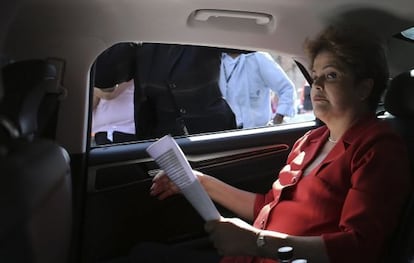Silva loses ground as Rousseff gains momentum in Brazilian voter polls
Socialist candidate's flip-flopping has helped boost president’s popularity

Dilma Rousseff is gaining momentum just 25 days before Brazil holds its presidential elections. The latest Datafolha Institute poll published on Wednesday showed that the president was likely to tie with Brazilian Socialist Party (PSB) candidate Marina Silva in the run-off vote. Rousseff, of the Workers’ Party (PT), has risen by two points and now 43 percent of prospective voters say they would elect her. Silva fell by one point but still pulls in 47 percent of prospective votes, exactly where she was on August 18, just after her nomination was made official. Although she had garnered a 10-point lead by August 28, she tumbled down by seven points last week. Given the two-point margin of error, these two presidential hopefuls are running neck and neck.
If the elections were to take place today, Rousseff and Silva would take first and second place and face each other in a run-off, leaving behind Brazilian Social Democratic Party (PSDB) candidate Aécio Neves. Before Silva joined the race, Neves was number two in the polls.
According to the new survey, the president and Silva would technically tie for first place in the first round of voting. Rousseff would receive 36 percent of the vote and Silva would get 33 percent followed by Neves with 15 percent. In the previous poll published on September 3, the president had a narrower lead with 35 percent of votes while Silva was expected to receive 34 percent.
According to the new poll, Rousseff would receive 36 percent of votes in the first round, and Silva would receive 33 percent
Datafolha also tracked the approval ratings of the candidates. Rousseff has a 33-percent approval rating – the highest among the contenders – but has lost one point since the last poll on August 14. Silva, on the other hand, only received 18 percent and her approval rating has fallen by seven points. Neves has dropped by five points.
The poll also surveyed voters’ knowledge of the candidate’s electoral identification numbers. Voters need to use these numbers for their vote to count. Only 25 percent of Silva’s supporters knew her number, while 54 percent of Rousseff’s prospective voters knew her corresponding electoral digits and 42 percent of Neves’ supporters knew his.
Rousseff’s gains in the polls seem to be the result of Silva’s flip-flopping on her proposals and of her radio and TV ad campaign. In the last few days, the president has focused on attacking her main rival and on presenting herself as tough on corruption. During one program, Rousseff listed a series of measures that she says she took to combat corrupt practices, including legislative amendments and operational changes within the federal police corps.
Silva’s seesaw in the polls does not surprise her party. Internal PSB surveys had already shown that the ex-senator would either stop growing or grow at a slower rate as the race went on. Silva had been on an upward climb after she took over the presidential ticket in the wake of Eduardo Campos’ death in August. Analysts say there were three reasons for the trend: the impact of her 2010 presidential run when she received 19 million votes, the commotion surrounding Campos’ death, and the fact that she represented an alternative to the bipartisanship of the Workers’ Party and Brazilian Social Democratic Party, which has dominated national politics in Brazil for at least two decades.
Translation: Dyane Jean François
Tu suscripción se está usando en otro dispositivo
¿Quieres añadir otro usuario a tu suscripción?
Si continúas leyendo en este dispositivo, no se podrá leer en el otro.
FlechaTu suscripción se está usando en otro dispositivo y solo puedes acceder a EL PAÍS desde un dispositivo a la vez.
Si quieres compartir tu cuenta, cambia tu suscripción a la modalidad Premium, así podrás añadir otro usuario. Cada uno accederá con su propia cuenta de email, lo que os permitirá personalizar vuestra experiencia en EL PAÍS.
¿Tienes una suscripción de empresa? Accede aquí para contratar más cuentas.
En el caso de no saber quién está usando tu cuenta, te recomendamos cambiar tu contraseña aquí.
Si decides continuar compartiendo tu cuenta, este mensaje se mostrará en tu dispositivo y en el de la otra persona que está usando tu cuenta de forma indefinida, afectando a tu experiencia de lectura. Puedes consultar aquí los términos y condiciones de la suscripción digital.








































